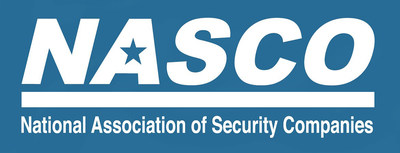NASCO Response to USA Today Article on G4S
WASHINGTON, Nov. 15, 2019 /PRNewswire/ -- On October 30, 2019, USA Today published the first in a series of reports from a year-long investigation of the private security company G4S which employs almost 50,000 personnel in the United States. The report detailed alleged past isolated incidents of criminal behavior and misconduct by G4S security officers dating back to 2009 and beyond, with a particular focus on screening and hiring practices.

The National Association of Security Companies (NASCO) is the leading trade association for the U.S. contract private security industry, and its member companies, including G4S, employ over 450,000 security officers across the nation. Every day, these dedicated officers protect schools, houses of worships, hospitals, businesses, retail centers, apartment buildings, critical infrastructure, and other venues. In countless occasions it is a security officer who is the first to respond to criminal, violent, and life-threatening activity. From Las Vegas, to Huntsville, Alabama from Gilroy, California to Boston, security officers are putting their lives on the line to keep the public safe and they play a crucial role in supporting law enforcement.
While many of the incidents reported in the article are serious, there is simply no real evidence that they are the direct result of a systematic failure within G4S. Moreover, the greater inference of the article that the vetting of personnel by private security companies is problematic is grossly inaccurate. Like any profession, applicant screening in private security is not 100% effective in all cases, yet NASCO and its members understand that hiring trustworthy persons is particularly important in the public safety arena. That is why our members are committed to constantly evolving best practices and protocols for screening, and the report failed to provide a balanced view of steps and processes that G4S and other responsible security providers are taking, and improving upon, in order to better serve the public.
One assertion made in the report is that security service providers are cutting corners on employee vetting, training, and oversight to save money. That is not only inaccurate, but it is bad for business. In today's complex and sometimes dangerous, as well as litigious, society, responsible security companies and their clients understand the importance and value of properly selected and trained personnel. If there is an incident involving a security officer, the screening, training and oversight of the officer comes under a microscope.
So, while a majority of states require security officers to undergo criminal background checks and receive state mandated training to be licensed to work as security officer, security companies often go beyond those requirements. This is not only to provide -- and retain -- clients with better-vetted, better-trained and thus better-performing officers, but also to reduce potential risks and liability. The same goes with personnel oversight, and companies, including G4S, have robust processes for clients and fellow employees to report inappropriate behavior.
Another questionable inference is that security companies can do a lot more to vet job applicants. Unlike law enforcement agencies, private security companies do not have universal access to state and federal criminal databases for their employees, nor do they have access to military and law enforcement employment records. In this regard, since 2012, NASCO and its members have been lobbying Congress to pass federal legislation (the "Private Security Officer Screening Improvement Act") that will provide employers of security officers with universal access to FBI checks on applicants and employees. This legislation would improve upon a previous law that NASCO helped enact, the "Private Security Officer Employment Authorization Act," which while providing federal authorization to companies to request FBI checks, required the checks go through a state agency.
At the state level, NASCO and its members have supported legislation to implement security officer licensing laws in Colorado and Michigan, as well as state efforts to join the FBI "Rap Back" program that enables state licensing agencies to be notified when a security officer licensed in their state is arrested. NASCO has also worked with the FBI to explore ways to promote better information sharing between the FBI and private security companies.
Today, security companies are providing their officers with new technologies, including the use of Artificial Intelligence, that enable them to perform their jobs better. They are refining their training and operational procedures for officers to meet new security threats. However, in such a labor-intensive business, the quality of the employee is what sets the foundation for success, and it is important for the U.S. public to understand that incidents involving misconduct by private security officers are rare outliers in the industry, and the industry is working to make them even rarer.
For more information on NASCO and the private security industry go to www.nasco.org
Contact: Steve Amitay, NASCO Executive Director, 202-347-4805, [email protected]
SOURCE NASCO
News published on and distributed by:



